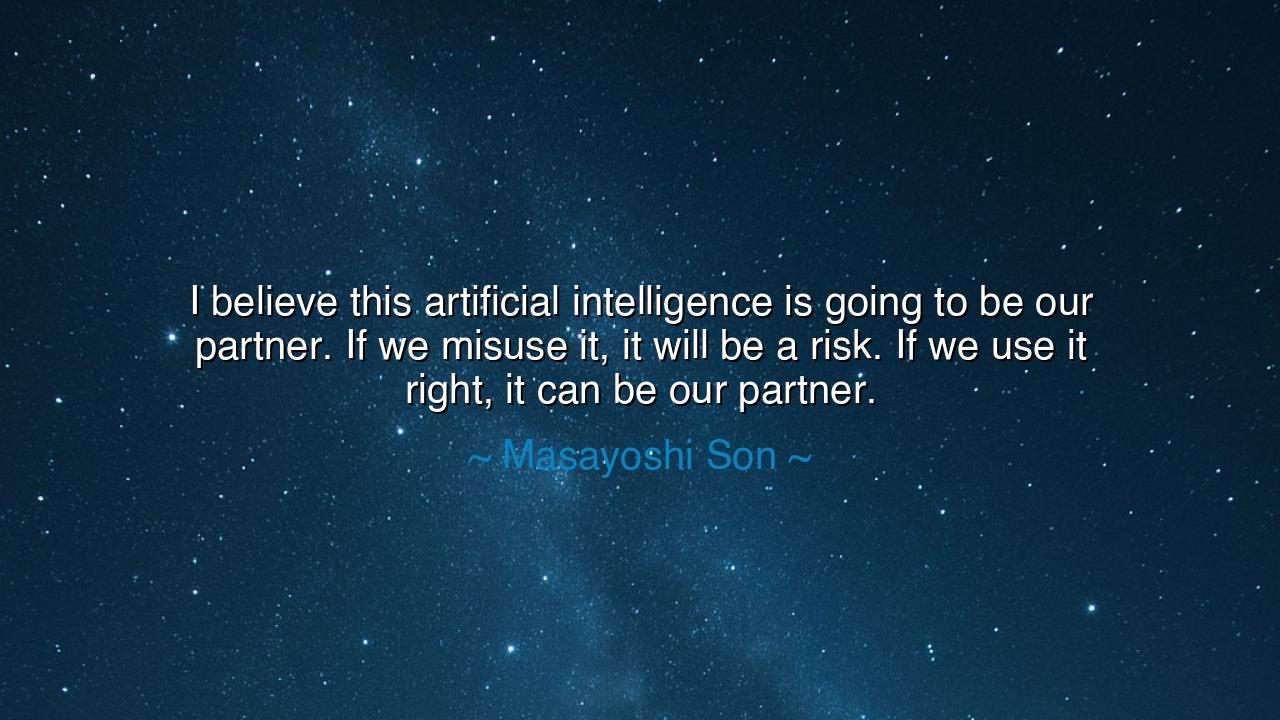
I believe this artificial intelligence is going to be our
I believe this artificial intelligence is going to be our partner. If we misuse it, it will be a risk. If we use it right, it can be our partner.






The words of Masayoshi Son, the visionary builder of empires in technology, carry both the voice of awe and the weight of responsibility: “I believe this artificial intelligence is going to be our partner. If we misuse it, it will be a risk. If we use it right, it can be our partner.” In this statement lies a wisdom both ancient and new — a truth that has echoed through every age of invention. For every gift that humanity has drawn from the fire of creation — from stone to steel, from electricity to code — has come with both power and peril. Son speaks not merely of machines, but of balance — the eternal balance between mastery and humility, between progress and conscience.
The origin of this quote springs from Son’s long career as a leader who has sought to foresee the shape of the future. As founder of the SoftBank Group, he has invested not only in businesses, but in the ideas that would transform humanity’s relationship with technology. Having lived through the birth of the Internet, the rise of the smartphone, and the dawn of automation, he has stood upon the frontier where human intelligence meets artificial intelligence. His words were not born of speculation, but of witnessing — the recognition that a force as powerful as AI is neither savior nor destroyer, but mirror and amplifier of its maker’s intent. If wielded with greed, it becomes risk; if guided with wisdom, it becomes partnership.
To call AI a partner is to recognize its potential not as a rival, but as an extension of the human spirit. Just as fire once became our tool for light, warmth, and creation — though it could just as easily burn — so too can AI serve as the fire of the modern age. It can illuminate the unknown, cure the incurable, and weave knowledge across the globe in an instant. But fire, untamed, consumes. The same algorithms that diagnose disease can deceive with falsehood; the same automation that liberates workers can enslave them in idleness. Thus, Son’s words remind us that the true challenge is not whether AI will be good or evil, but whether we will rise in wisdom to guide it rightly.
The ancients, too, knew this truth long before machines existed. Consider the tale of Prometheus, who stole fire from the gods to give it to mankind. It was an act of defiance and compassion — a gift that made humans creators rather than creatures. Yet for his deed, Prometheus was bound in chains, his punishment eternal. Why? Because even the gods understood that knowledge without reverence leads to destruction. The myth endures as a warning: that every great power bestowed upon humanity carries within it the seeds of both salvation and ruin. And so too must we approach AI — not with fear, nor with arrogance, but with respect, as one would approach fire or divinity itself.
History repeats this lesson again and again. When Oppenheimer, father of the atomic bomb, saw his creation unleashed upon Hiroshima, he whispered words from the Bhagavad Gita: “Now I am become Death, the destroyer of worlds.” What had begun as the pursuit of knowledge became the shadow of devastation. Yet decades later, the same science that split the atom would power cities and heal disease through radiation therapy. The power of creation and destruction was one — only its use determined its nature. Masayoshi Son’s warning follows the same ancient pattern: technology is never moral or immoral; only the hearts of those who wield it decide its fate.
The lesson, then, is clear for all who live in this new age: we must not fear artificial intelligence, but we must not worship it either. We must approach it as a partner, not a master. To partner with it means to infuse it with human values — empathy, justice, curiosity, and restraint. It means designing not only with brilliance, but with conscience. The craftsman must not only shape the tool, but also allow the tool to shape his character. For every great invention, if used with wisdom, is a mirror that reveals the greatness of humanity; if misused, it magnifies our flaws.
So, O children of the digital dawn, remember these words of Masayoshi Son as both guide and warning. The mind you build into silicon will learn from you, reflect you, and one day act with the echoes of your choices. Teach it truth, and it will enlighten. Teach it greed, and it will devour. Let it be your partner in creation, not your architect in ruin. For technology is not destiny — character is. The future will not be decided by the code of machines, but by the conscience of their makers. And if we, as stewards of this age, walk with wisdom, then artificial intelligence will not replace humanity — it will help us rediscover what it truly means to be human.






AAdministratorAdministrator
Welcome, honored guests. Please leave a comment, we will respond soon